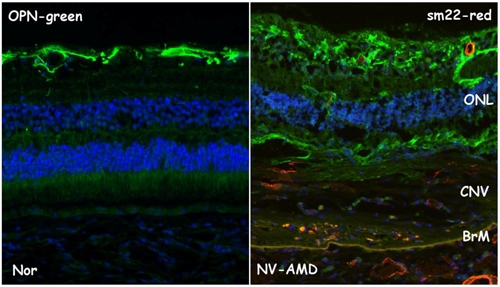Overview
Age-related macular degeneration (AMD) is the leading cause of central visual impairment amongst the elderly in the Western World and is becoming increasingly prevalent World-wide. Our lab is focused on understanding the cellular and molecular pathogenic mechanisms underlying the dry and wet forms of AMD. Our ultimate goals are to identify signaling pathways, which become dysfunctional in AMD; develop animal models, which present with features of the human disease; and identify potential therapeutic targets. Several lines of investigation currently being followed include:
- Investigating nuclear receptor biology in the human retina and ‘AMD vulnerable’ cells as a function of aging and disease. Nuclear receptors represent one of the largest families of transcription factors, with 48 present in the human genome. They are critical modulators of developmental and physiological processes and are both targets of drugs as well as chemicals of environmental significance. Many of the processes regulated by nuclear receptors are also associated with retinal diseases such as AMD and diabetic retinopathy. We created a nuclear receptor atlas of human RPE cells, highlighting the expression of all the nuclear receptors, and identifying potential AMD-relevant candidate receptors. Ongoing studies include developing a definitive atlas of RPE cells and other ‘AMD-vulnerable’ cells, including choroidal endothelial cells (1) derived from young versus old human donor eyes, to examine the change in expression as a function of age, and (2) derived from old ‘normal’ versus ‘AMD disease’ donor eyes, to examine the change in expression as a function of disease.
- Understanding the cellular and molecular pathogenic mechanisms of lipids and oxidants in AMD. Epidemiological and animal model studies have shown an association between systemic health factors, such as dietary lipids and cigarette smoking, and disease progression. We are investigating how lipid-, toxin-, and inflammation-mediated injury of RPE and choroidal endothelial cells promotes pathogenic changes through activation of a subset of nuclear receptors including peroxisome proliferator activated receptors, retinoid X receptor, liver X receptor, and the toxin (oxidant) activated aryl hydrocarbon receptor. The tools we use in the lab in looking for the potential mechanisms driven by these transcription factors in disease, include establishing the presence of the signaling pathway of the receptors of interest in our in vitro cell culture models, examining the effect of receptor (dys)regulation in vivo, and determining expression in normal and disease human tissue.
See my interview with EyeSight "Rethinking Nuclear Receptors as Therapeutic Targets for AMD"
Lab Personnel
Mayur Choudhary, PhD
Research Associate Senior
Mayur.choudhary@duke.edu
Michael Lekwuwa
Research Technician
Micheal.lekwuwa@duke.edu
Vipul Parmar, PhD
Research Associate Senior
Vipulkumar.parmar@duke.edu
Tanu Parmar, PhD
Research Associate Senior
Tanu.parmar@duke.edu
Lab Images

Example of view from an AMD patient's perspective.

Osteopontin immunolocalizes to the nerve fiber layer in 'normal' human retina (left panel) and to the nerve fiber layer, plexiform layers and within the neovascular membrane (CNV) of 'AMD' retina (right panel).